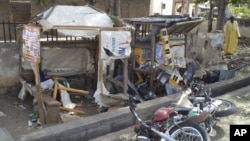JOS, NIGERIA - In what is known as Nigeria’s “Middle Belt,” sectarian clashes have killed thousands of people in the past eleven years. In an effort to prepare communities for outbreaks of violence, the International Committee of the Red Cross and the Nigerian Red Cross Society are training community members in emergency response techniques.
Outside a small school in the countryside of Plateau State, this Nigerian Red Cross trainer scrutinizes his students as they learn to carry a stretcher. “It’s not a parade,” he says, urging them not to march.
Here in the nearby city of Jos, near a military checkpoint erected between Christian and Muslim neighborhoods, trainer Rachael A. Shorunke says first-aid workshops teach students living in conflict-prone areas basic life-saving techniques.
“This area has been a very deadly area before," said Shorunke. "Muslims cannot go into Christians, and Christians cannot go into Muslims. So, they are in need of first aid training so that whenever there is crisis or there is violence or there is disaster around then they will be able to carry on with the response.”
U.S.-based Human Rights Watch says more than 1,000 people have died in the past two years in Jos, with “dozens” of incidents this year alone. The conflict appears to be along sectarian lines, but many say it has more to do with resources, politics and more than a decade of escalation and retaliation.
In an effort to bridge those differences Red Cross trainees are handpicked by local leaders to ensure rival communities are trained together.
Nigerian Red Cross Branch Secretary Manasseh A. Panpe says the training sessions are intended to teach practical skills, but he says, they also ease tensions between feuding communities.
"We don’t mention peace building but the activities that are carried out are geared towards mainstreaming peace building in the training," said Panpe.
Panpe says the hardest thing for the various groups to do together is agree upon chosen leaders, which many say is a problem for Nigeria’s larger society as well.
Salma Musa, a mother of three and a trainee in Jos, says she expects more violence to come and she is preparing to volunteer as an emergency responder. But, she says, the fact that Christians and Muslims are training in the same room in what they call a “flashpoint” neighborhood, known for sectarian clashes, means things could be changing for the better.
“As we are here now it shows that the peace is coming back to Plateau State, [God Willing], I pray so. Because that when you look at last year - we could not come here,” said Musa.
Despite her optimism, and beefed up security in Jos, Musa says she expects to put her new first aid skills to use when another bomb explodes, or clashes erupt. Violence in this part of Nigeria, she says, can happen anywhere, at any time.
Outside a small school in the countryside of Plateau State, this Nigerian Red Cross trainer scrutinizes his students as they learn to carry a stretcher. “It’s not a parade,” he says, urging them not to march.
Here in the nearby city of Jos, near a military checkpoint erected between Christian and Muslim neighborhoods, trainer Rachael A. Shorunke says first-aid workshops teach students living in conflict-prone areas basic life-saving techniques.
“This area has been a very deadly area before," said Shorunke. "Muslims cannot go into Christians, and Christians cannot go into Muslims. So, they are in need of first aid training so that whenever there is crisis or there is violence or there is disaster around then they will be able to carry on with the response.”
U.S.-based Human Rights Watch says more than 1,000 people have died in the past two years in Jos, with “dozens” of incidents this year alone. The conflict appears to be along sectarian lines, but many say it has more to do with resources, politics and more than a decade of escalation and retaliation.
In an effort to bridge those differences Red Cross trainees are handpicked by local leaders to ensure rival communities are trained together.
Nigerian Red Cross Branch Secretary Manasseh A. Panpe says the training sessions are intended to teach practical skills, but he says, they also ease tensions between feuding communities.
"We don’t mention peace building but the activities that are carried out are geared towards mainstreaming peace building in the training," said Panpe.
Panpe says the hardest thing for the various groups to do together is agree upon chosen leaders, which many say is a problem for Nigeria’s larger society as well.
Salma Musa, a mother of three and a trainee in Jos, says she expects more violence to come and she is preparing to volunteer as an emergency responder. But, she says, the fact that Christians and Muslims are training in the same room in what they call a “flashpoint” neighborhood, known for sectarian clashes, means things could be changing for the better.
“As we are here now it shows that the peace is coming back to Plateau State, [God Willing], I pray so. Because that when you look at last year - we could not come here,” said Musa.
Despite her optimism, and beefed up security in Jos, Musa says she expects to put her new first aid skills to use when another bomb explodes, or clashes erupt. Violence in this part of Nigeria, she says, can happen anywhere, at any time.





